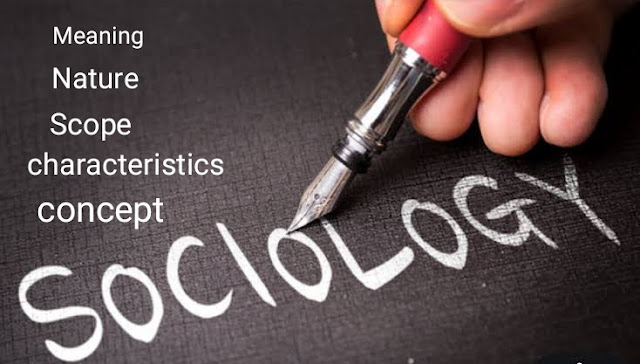Meaning of sociology:
Nature of sociology;
Scope of sociology;
Characteristics of sociology;
Concept of sociology;
 |
| Meaning, nature, scope, characteristics, concept of sociology |
Introduction:
Sociology is the scientific study of society, human behavior, and social interactions. It examines how individuals and groups interact within social structures and how these structures shape our lives. Sociology seeks to understand the social forces that influence our behavior, beliefs, and attitudes, as well as the ways in which society is organized and structured.
The field of sociology emerged in the 19th century as a response to the social changes brought about by industrialization and urbanization. Sociologists study a wide range of topics, including social inequality, social institutions, social change, culture, deviance, and socialization.
One of the key concepts in sociology is the sociological imagination, which encourages individuals to see the connections between their personal experiences and the larger social forces at all aspects of our social life.
Meaning of sociology:
Sociology is the scientific study of society, human social behavior, and the patterns and structures that shape social interactions. It examines how individuals and groups interact, how societies are organized and change over time, and how social factors influence human behavior and outcomes. Sociology seeks to understand and explain social phenomena such as social inequality, social institutions, social norms and values, social movements, and the impact of social forces on individuals and societies. It also explores the relationships between individuals and larger social systems, and how these interactions shape and are shaped by social structures and processes. Overall, sociology aims to provide insights into the social world and contribute to the understanding and improvement of society.
Nature of sociology:
Sociology is the scientific study of society, social behavior, and the patterns and structures that shape human interactions. It examines how individuals and groups interact within social institutions, such as family, education, religion, and government, and how these interactions influence social change and inequality. Sociology seeks to understand the social forces that shape human behavior, attitudes, and beliefs, and how these forces impact individuals and society as a whole. It also explores topics such as socialization, social stratification, social movements, culture, and social norms. Overall, sociology aims to provide insights into the complex dynamics of human society and contribute to the understanding and improvement of social issues and problems.
ALSO READ: what is sociology? Origin, definition, needs of sociology in education.
Scope of sociology:
The scope of sociology is broad and encompasses the study of various aspects of human society. It includes the examination of social behavior, social interaction, social institutions, social change, and social problems. Sociology seeks to understand how individuals and groups are influenced by social structures, cultural norms, and societal forces.
Some key areas within the scope of sociology include:
1. Socialization:
The study of how individuals learn and internalize social norms, values, and roles through socialization processes.
2. Social stratification:
The examination of social inequality, including the distribution of wealth, power, and resources in society.
3. Social institutions:
The analysis of various social institutions such as family, education, religion, economy, and politics, and how they shape individuals and social life.
Characteristics of Sociology:
Some of the Characteristics of sociology are mention below:-
1. Study of society:
Sociology is the scientific study of society, including its structure, institutions, and social interactions. It examines how individuals and groups interact and how social structures and systems shape human behavior.
2. Focus on social relationships:
Sociology focuses on understanding the patterns and dynamics of social relationships. It explores how individuals are influenced by social factors such as culture, social class, gender, and race.
3. Emphasis on social change:
Sociology seeks to understand and explain social change and its impact on individuals and society. It examines the causes and consequences of social change, as well as the processes through which societies evolve over time.
4. Use of empirical research:
Sociology relies on empirical research methods to gather and analyze data. This includes conducting surveys and examine in every social aspects.
Concept of sociology:
Sociology is the scientific study of society, social behavior, and the patterns and structures that shape human interactions. It examines how individuals and groups are influenced by social forces, such as culture, socialization, social institutions, and social inequality. Sociology seeks to understand and explain social phenomena, including social change, social stratification, social movements, and the impact of social factors on individuals and societies.
The concept of sociology is based on the idea that human behavior is not solely determined by individual characteristics, but is also shaped by social factors and structures. It explores how social norms, values, and beliefs influence people's actions and interactions, and how these social forces are created and maintained.
Sociology also examines the ways in which social structures and institutions effects the social life of an individuals in the wider aspects in a society.
ALSO READ: Relationship between teaching and learning; Variables of teaching.
0 comments:
Post a Comment
Please do not spam the inbox